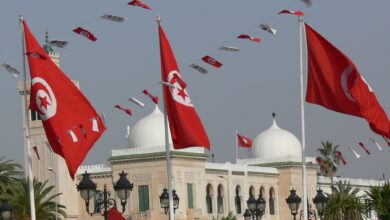I traveled to Tunisia over a week ago to attend the country‘s first free elections. As I left Cairo, I had given in to a sense that Egypt had lost its way, a feeling that has become widely shared in this country. I returned to find Egyptians even further engulfed in pessimism about the future. The Maspero massacre on 9 October, which took the lives of over two dozen Copts, made things worse: It left many with an overwhelming feeling that the country is moving in a terrible direction, perhaps even to the brink of internal strife. But this does not seem to alarm the generals ruling the country, one of whom said recently in a private meeting that he feared Egypt would “go the way of Somalia.” If that’s the case, why do things like the chastity of Egyptian women (who were arrested in March and forced by military police to undergo “virginity tests” for the first time in Egyptian history) top the military’s agenda? Meanwhile, the Supreme Council of the Armed Forces (SCAF) has given a green light for the prosecution of human rights advocates on charges of high treason and harming national security. This, frankly, is shocking.
Contrast this to the public mood in Tunisia. While the people I met there disagreed about many things, all of them were optimistic about the future. From the ministers of interior and security reform, to the heads of the Supreme Authority for Elections of the Constituent Assembly and the National Independent Committee for Media and Communication Reform, to politicians, rights activists and trade unionists who led the uprising in the mining belt in Redeyef, all of them told me their country was moving in the right direction. Post-revolution Tunisia is not perfect and it will certainly face major challenges in the future. But it is on the right path.
What accounts for this difference in public opinion? Tunisian rights advocate Ridha Raddaoui explained Tunisia’s progress in simple terms: “We were lucky that our army was politically weak.” Another rights activist, Ayachi Hammami, concurred, even before the discussion had turned to Egypt.
I believe differences in three factors have distinguished Tunisia from Egypt in the post-revolution period: its army, its Islamists and its political elite.
The Tunisian army played a decisive role in the revolution (by refusing to open fire on demonstrators and by stopping police officers who tried to continue the crackdown), but it did not assume control of the country. After the departure of Ben Ali, power was immediately transferred to a civilian government. The army chose to watch from a distance – close enough to allow for intervention, but only if the state was in danger of collapse. Ultimately, the army bet on the wisdom of the Tunisian people and the political competence they acquired over time and through experience.
Tunisia’s Islamists are newer to politics and less opportunistic and reactionary than their Egyptian counterparts. They adopt political not religious platforms and refrain from making provocative demands, like the application of Islamic law or even special recognition for it in the constitution. Tunisian Islamists have not made it their mission to police Tunisians’ morals or their private lives. This has made the conflict over identity in Tunisia less polarizing than in Egypt. Thus, Tunisians find it relatively easier to reach a consensus over the future shape of the country, even with Ennahda’s recent victory.
Finally, the political acumen of the Tunisian elite, in comparison to their Egyptian peers, is also of great importance. Although both countries witnessed leaderless revolutions, the Tunisian elite caught on early to the importance of not leaving a political vacuum that could be filled by counter-revolutionary forces. Instead, they created the High Council for Achieving the Goals of the Revolution, a clever structure that brought together a wide range of political and civil society actors: Islamist and secular party representatives, trade unionists, human rights advocates, and several distinguished public figures. To avoid disagreements that could damage this historical initiative, no political parties were allowed to assume ruling positions in the council. The political elites did not waste their energies on settling scores. Instead, they focused on building institutions, writing a constitution, and adopting legislation that, upon implementation, would address grievances of the past.
Tunisia’s Council did not wait for recognition from anyone, unlike the proposed presidential council in Egypt that was rejected by the ruling Supreme Council of Armed Forces (SCAF) and conservative political forces from the start. Rather, it fought to earn political legitimacy through responsible social practice. As a result, it won legal recognition as well and became the official platform for drafting legislation in the transitional period. It established independent civil commissions to manage the elections and reform the media.
In Egypt, by contrast, political elites have wasted their time either seeking retribution against their enemies or cozying up to SCAF in hopes of sharing power. They are very good at issuing statements and staging demonstrations, but their words and actions have not created any new facts on the ground. Egypt’s power structure has remained unchanged and the army, which rose to helm of politics six decades ago, is still in charge.
Since 1952, Egypt has only been ruled by leaders from a military background. As a result, the generals that took power after the ouster of Hosni Mubarak are more adept than other political players. As the SCAF works to secure its long-term interests, it has managed to preserve the old regime, to divide its revolutionary opponents and drain their energies, and to revive the tired old formula of “It’s either us or the Islamists.” Meanwhile, the US administration has not reconsidered its stance toward Egypt or the Arab region as whole. It continues to prioritize “stability,” even in a time of mass revolt, thus choosing to stand on the wrong side of progress.
Thus far the Tunisians have fostered a political and social consensus in the post-revolution period and have managed a transition where every small success seems to lead to a greater one. By contrast, the transition in Egypt has been marked by one failure after another, and may portend even greater disasters to come.
Bahey el-din Hassan is director of the Cairo Institute for Human Rights Studies.



